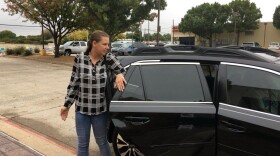Ana Flores can vote for the first time this year. The 18-year-old lives in Houston with her mom. Like many young people who just got the right to vote, she was curious about what it would be like.
“I just wanted to try it out," she said, "see how it would feel for the first time.”
Flores was registered to vote and aware of some of the races on the ballot; she said she was particularly excited about voting in the U.S. Senate race. But there was a big thing standing in the way of her actually voting: the Texas voter ID law requiring her to show a state-issued identification at the polls.
Flores said she had had trouble getting an ID from the Texas Department of Public Safety before.
“I went up there just one time when I was about, I think, 16 or 17,” she said. “But we’d go back like three times – back home, go back, back home, go back. So, I just didn’t try again.”
Flores didn’t have the proper documents to prove she was a resident of Texas.
She knew she'd have to try again if she wanted to vote this year. Luckily for her, a group called Spread the Vote started reaching out to students at her school.
“Our focus is to make sure they have the ID so that they can actually vote,” said Christina Sanders, state director for Spread the Vote.
Spread the Vote has been in Texas since May. Sanders said the group is helping populations who have the hardest time getting IDs, including the homeless population and students.
“It is extremely challenging if you are 17 and eight months eligible to vote, or 18, and you don’t have a light bill in your name," she said, "and you don’t have a bank account in your name, or lease in your name to be able to establish yourself as a Texas resident."
Sanders said this is also really hard for college students – particularly out-of-state college students.
The list of IDs allowed at the polls is limited. While a handgun license, military ID or U.S. passport are allowed, for example, a student ID is not.
People who face obstacles getting an ID can still vote in Texas, though. Federal courts forced the state to let people sign a legal document saying they had problems getting an ID in order to cast a ballot.
But for low-income people who want to make sure they have the required state-issued election ID, state ID or driver’s license, it can be expensive.
“A lot of people have hurdles with the cost,” Sanders said. “On average it costs $40 to get an ID in Texas – and that’s if you were born in Texas. But sometimes it’s more – up to $200 – if you are born in other states.”
Sanders said her group helps cover those costs – and it helps people get supporting documents, including Social Security cards and birth certificates. She said many students don’t have those documents handy, for a whole range of reasons.
“Every child doesn’t live with their parents,” Sanders said. “Their parents don’t keep up with the documents. One child that we recently helped to get an ID, he recently lost everything in Harvey – all his documents in Harvey. And he was just like, ‘We don’t have a car. We just didn’t go back and get them. So, I need to get them.’”
Sanders said there's also a short window for students to get these documents, because government offices close roughly around the same time students are let out of school.
“Going to get your ID to vote is not an excused absence,” Sanders said.
Because of Spread the Vote, Flores was able to get an ID in time to vote early. She said voting – with her ID in hand – was easier than she expected.
“I thought it was going to be difficult,” she said. “I didn’t think it would be that easy.”
And Flores said she would probably vote again in the future.
Unfortuantely, Sanders said, some students don’t get this all worked out in time.
“We even had a student in Houston cry because of the documents not matching up,” she said.
Copyright 2020 KUT 90.5. To see more, visit . 9(MDAxODQzOTgwMDEyMTcyNjI4MTAxYWQyMw004))





